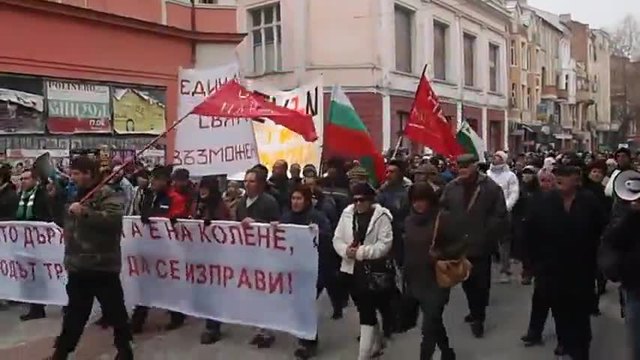
The Union of Communists of Bulgaria released a statement about the recent anti-communist law passed by the Bulgarian Parliament.
ICP, 1 December 2016
The Bulgarian Parliament adopted a law declaring "the communist regime in Bulgaria" as criminal. After three hours of debate, the law was adopted with 104 votes in favour and 46 against. While, MPs from the GERB, the Movement for Rights and Freedoms, the Reformist Block, the Patriotic Front, and the Bulgarian Democratic Centre voted in favour; the Bulgarian Socialist Party, ABC, some members from the Patriotic Front and Ataka Party voted against the law.
The amendments cover the slogans, images, signs and similar objects referring the communist ideology and claims the communist regime tot be removed and prohibited in public spaces. Furthermore, if such an object is impossible to be removed, a sign noting: "the communist regime in Bulgaria during the period 09.09.1944 - 11.10.1989 and the actions of the CP of Bulgaria have been declared criminal by a law voted upon by the 38th National Assembly", is obliged to be put.
The law also requires that in schools and universities compulsory courses which teach the socalled "crimes" during Bulgaria's socialist era.
Regarding the amendment of the law, the Union of Communists of Bulgaria (UCB) released a statement titled "Fascism in Bulgaria has returned!" The chairmen of the Central Committee of the UCB, Pavel Ivanov, called the anti-capitalist people of Bulgaria, Europe and the world to express their protest against the law. Ivanov also stressed that they will continue to defend the gains and values of the Bulgarian Communist Party.
In the Europea Parliament assembly, members from the Communist Party of Greece (KKE), raised the issue regarding the anti-communist law in Bulgaria. The MPs from KKE stated that the recent law from Bulgarian Parliament is "part of the EU's anticommunist campaign and it goes hand in hand with the anti-people attack". KKE delegation also raised several questions at the EP. The questions are as follows:
"What is the position of the European Commission against this new anticommunist law in Bulgaria?
Does the Commission confirm the fact that the EU has given directions for the establishment of anticommunist laws as a series of member states of the EU are promoting similar unacceptable persecution measures against the Communist Parties and the action of communists?"
The "de-communisation" process in Bulgaria gained pace in the 2000's, like the other post socialist countries. The target of integration with EU accelerated this process. The symbols of the socialist era and communism have already been restricted in Bulgaria before the recent amendment. Yet the new law evolved the restrictions into serious law sentences, similar to the practices of the Ukrainian government.